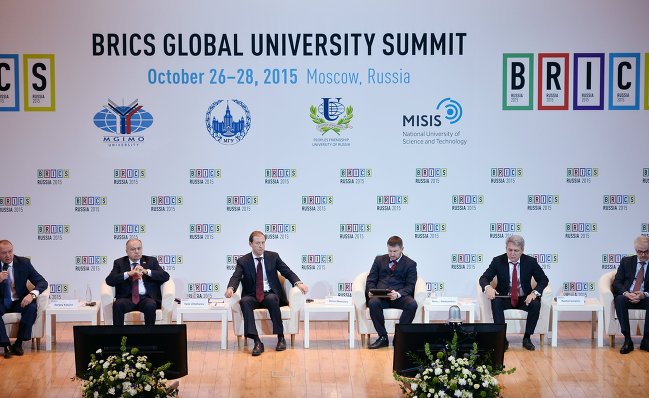
BRICS Global University Summit in Moscow
On 26-28 October, Moscow hosted the BRICS Global University Summit (GUS). It focused on academic mobility, educational migration, university ratings and consortiums, the accessibility of education and BRICS distance education. Participants also discussed the formation of the BRICS Network University.
Speaking at the summit, Deputy Minister of Education and Science Alexander Klimov said 10 universities from each country will take part in the work of the Network University at the first stage. They will place a priority on energy, computer sciences, information security, environmental protection and climate change, water resources and pollution cleanup, as well as the economy, Mr Klimov said, adding that Russia's initiative for the Network University has already been approved at various venues and the text of the agreement regarding its establishment is practically ready.
Speaking at a special plenary session, entitled Universities and Science, Deputy Minister of Education and Science Lyudmila Ogorodova pointed out that a modern university fulfils three major tasks: It creates the HR potential for a country's social and economic development, is a fundamental science development centre and carries out new R&D projects in conjunction with the business sector.
"To be sure, international scientific and technical cooperation between universities is a key factor in their efficiency and competitiveness. This is evident not only from the interest and active cooperation between Russian universities and their counterparts in the BRICS countries but also from the fact that joint publications with foreign partners have statistically a higher citation index," she said.
Universities can take on the role as centres for the organisation of network interaction between researchers from different countries, she said.
The participants also discussed projects at the nexus of education and production.
Russian Minister of Industry and Trade Denis Manturov said BRICS countries plan to set up national centres of research and testing.
"At national centres we consolidate research and testing facilities in the key economic sectors. Such centres already exist in the nuclear and aviation industries. We plan to establish similar centres in ship-building and manufacturing new materials," he said, noting that Russia has formed about 30 industry-specific engineering centres on the basis of leading technical universities.
"Other BRICS countries are also striving to develop such centres," he said.
The participants also reviewed cooperation among BRICS countries in various economic areas. Chairman of the BRICS Business Council and President of the Chamber of Commerce and Industry Sergey Katyrin said BRICS countries have many more points of contact than it seems at first glance and that their cooperation potential is substantial.
He mentioned several of the most promising areas in BRICS trade, economic and investment cooperation, on which the Business Council is focusing. These include the formation of a pool of investment projects, the gradual elimination of barriers in economic ties, supporting joint projects and programmes by business communities and developing BRICS online trade. Mr Katyrin said the results of the work in these and other areas will be included in the Business Council's annual report for 2015-2016.
